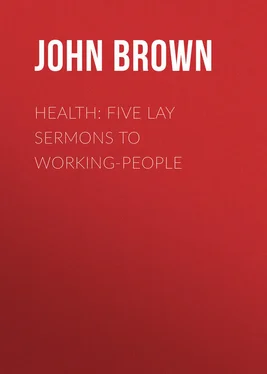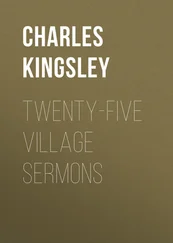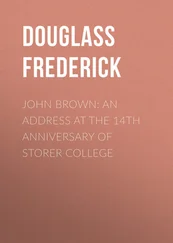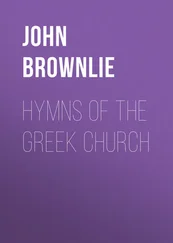John Brown - Health - Five Lay Sermons to Working-People
Здесь есть возможность читать онлайн «John Brown - Health - Five Lay Sermons to Working-People» — ознакомительный отрывок электронной книги совершенно бесплатно, а после прочтения отрывка купить полную версию. В некоторых случаях можно слушать аудио, скачать через торрент в формате fb2 и присутствует краткое содержание. ISBN: , Жанр: foreign_antique, foreign_prose, на английском языке. Описание произведения, (предисловие) а так же отзывы посетителей доступны на портале библиотеки ЛибКат.
- Название:Health: Five Lay Sermons to Working-People
- Автор:
- Жанр:
- Год:неизвестен
- ISBN:http://www.gutenberg.org/ebooks/37640
- Рейтинг книги:5 / 5. Голосов: 1
-
Избранное:Добавить в избранное
- Отзывы:
-
Ваша оценка:
- 100
- 1
- 2
- 3
- 4
- 5
Health: Five Lay Sermons to Working-People: краткое содержание, описание и аннотация
Предлагаем к чтению аннотацию, описание, краткое содержание или предисловие (зависит от того, что написал сам автор книги «Health: Five Lay Sermons to Working-People»). Если вы не нашли необходимую информацию о книге — напишите в комментариях, мы постараемся отыскать её.
Health: Five Lay Sermons to Working-People — читать онлайн ознакомительный отрывок
Ниже представлен текст книги, разбитый по страницам. Система сохранения места последней прочитанной страницы, позволяет с удобством читать онлайн бесплатно книгу «Health: Five Lay Sermons to Working-People», без необходимости каждый раз заново искать на чём Вы остановились. Поставьте закладку, и сможете в любой момент перейти на страницу, на которой закончили чтение.
Интервал:
Закладка:
Health: Five Lay Sermons to Working-People
Affectionately inscribed to the memory of the Rev. James Trench, the heart and soul of the Canongate Mission, who, while he preached a pure and a fervent gospel to its heathens, taught them also and therefore to respect and save their health, and was the Originator and Keeper of their Library and Penny Bank, as well as their Minister.
PREFACE
THREEof these sermons were written for, and (shall I say?) preached some years ago, in one of the earliest missionary stations in Edinburgh, established by Broughton Place Congregation, and presided over at that time by the Reverend James Trench; one of the best human beings it was ever my privilege to know. He is dead; dying in and of his work, – from typhus fever caught at the bedside of one of his poor members – but he lives in the hearts of many a widow and fatherless child; and lives also, I doubt not, in the immediate vision of Him to do whose will was his meat and his drink. Given ten thousand such men, how would the crooked places be made straight, and the rough places plain, the wildernesses of city wickedness, the solitary places of sin and despair, of pain and shame, be made glad! This is what is to regenerate mankind; this is the leaven that some day is to leaven the lump.
The other two sermons were never preached, except in print; but they were composed in the same key. I say this not in defence, but in explanation. I have tried to speak to working men and women from my lay pulpit, in the same words, with the same voice, with the same thoughts I was in the habit of using when doctoring them. This is the reason of their plain speaking. There is no other way of reaching these sturdy and weather and work-beaten understandings; there is nothing fine about them outside, though they are often as white in the skin under their clothes as a duchess, and their hearts as soft and tender as Jonathan's, or as Rachel's, or our own Grizel Baillie's; but you must speak out to them, and must not be mealy-mouthed if you wish to reach their minds and affections and wills. I wish the gentlefolks could hear and could use a little more of this outspokenness; and, as old Porson said, condescend to call a spade a spade, and not a horticultural implement; five letters instead of twenty-two, and more to the purpose.
You see, my dear working friends, I am great upon sparing your strength and taking things cannily. "All very well," say you; "it is easy speaking, and saying, Take it easy; but if the pat's on the fire it maun bile." It must, but you needn't poke up the fire forever, and you may now and then set the kettle on the hob, and let it sing, instead of leaving it to burn its bottom out.
I had a friend who injured himself by overwork. One day I asked the servant if any person had called, and was told that some one had. "Who was it?" "O, it's the little gentleman that aye rins when he walks !" So I wish this age would walk more and "rin" less. A man can walk farther and longer than he can run, and it is poor saving to get out of breath. A man who lives to be seventy, and has ten children and (say) five-and-twenty grandchildren, is of more worth to the state than three men who die at thirty, it is to be hoped unmarried. However slow a coach seventy may have been, and however energetic and go-ahead the three thirties, I back the tortoise against the hares in the long run.
I am constantly seeing men who suffer, and indeed die, from living too fast; from true though not consciously immoral dissipation or scattering of their lives. Many a man is bankrupt in constitution at forty-five, and either takes out a cessio of himself to the grave, or goes on paying ten per cent for his stock-in-trade; he spends his capital instead of merely spending what he makes, or better still, laying up a purse for the days of darkness and old age. A queer man, forty years ago, – Mr. Slate, or, as he was called, Sclate , who was too clever and not clever enough, and had not wisdom to use his wit, always scheming, full of "go," but never getting on, – was stopped by his friend, Sir Walter Scott, – that wonderful friend of us all, to whom we owe Jeanie Deans and Rob Roy, Meg Merrilies and Dandie Dinmont, Jinglin' Geordie, Cuddie Headrigg, and the immortal Baillie, – one day in Princess Street. "How are ye getting on, Sclate?" "Oo, just the auld thing, Sir Walter; ma pennies a' gang on tippenny eerands ." And so it is with our nervous power, with our vital capital, with the pence of life; many of them go on "tippenny eerands." We are forever getting our bills renewed, till down comes the poor and damaged concern with dropsy or consumption, blazing fever, madness, or palsy. There is a Western Banking system in living, in using our bodily organs, as well as in paper-money. But I am running off into another sermon.
Health of mind and body, next to a good conscience, is the best blessing our Maker can give us, and to no one is it more immediately valuable than to the laboring man and his wife and children; and indeed a good conscience is just moral health, the wholeness of the sense and the organ of duty; for let us never forget that there is a religion of the body, as well as, and greatly helpful of, the religion of the soul. We are to glorify God in our souls and in our bodies, for the best of all reasons, because they are his , and to remember that at last we must give account, not only of our thoughts and spiritual desires and acts, but all the deeds done in our body . A husband who, in the morning before going to his work, would cut his right hand off sooner than injure the wife of his bosom, strangles her that same night when mad with drink; that is a deed done in his body, and truly by his body, for his judgment is gone; and for that he must give an account when his name is called; his judgment was gone; but then, as the child of a drunken murderer said to me, "A' but, sir, wha goned it?" I am not a teetotaler. I am against teetotalism as a doctrine of universal application; I think we are meant to use these things as not abusing them, – this is one of the disciplines of life; but I not the less am sure that drunkenness ruins men's bodies, – it is not for me to speak of souls, – is a greater cause of disease and misery, poverty, crime, and death among the laboring men and women of our towns, than consumption, fever, cholera, and all their tribe, with thieving and profligacy and improvidence thrown into the bargain: these slay their thousands; this its tens of thousands. Do you ever think of the full meaning of "he's the waur o' drink?" How much the waur? – and then "dead drunk," – "mortal." Can there be anything more awfully significant than these expressions you hear from children in the streets?
You will see in the woodcut a good illustration of the circulation of the blood: both that through our lungs, by which we breathe and burn, and that through the whole body, by which we live and build. That hand grasps the heart, the central depot, with its valves opening out and in, and, by its contraction and relaxation, makes the living fluid circulate everywhere, carrying in strength, life, and supply to all, and carrying off waste and harm. None of you will be the worse of thinking of that hand as His who makes, supports, moves, and governs all things, – that hand which, while it wheels the rolling worlds, gathers the lambs with his arm, carries them in his bosom, and gently leads those that are with young, and which was once nailed for "our advantage on the bitter cross."
J. B.23 Rutland Street,
December 16, 1861.
SERMON I
EVERYBODYknows the Doctor; a very important person he is to us all. What could we do without him? He brings us into this world, and tries to keep us as long in it as he can, and as long as our bodies can hold together; and he is with us at that strange and last hour which will come to us all, when we must leave this world and go into the next.
Читать дальшеИнтервал:
Закладка:
Похожие книги на «Health: Five Lay Sermons to Working-People»
Представляем Вашему вниманию похожие книги на «Health: Five Lay Sermons to Working-People» списком для выбора. Мы отобрали схожую по названию и смыслу литературу в надежде предоставить читателям больше вариантов отыскать новые, интересные, ещё непрочитанные произведения.
Обсуждение, отзывы о книге «Health: Five Lay Sermons to Working-People» и просто собственные мнения читателей. Оставьте ваши комментарии, напишите, что Вы думаете о произведении, его смысле или главных героях. Укажите что конкретно понравилось, а что нет, и почему Вы так считаете.












